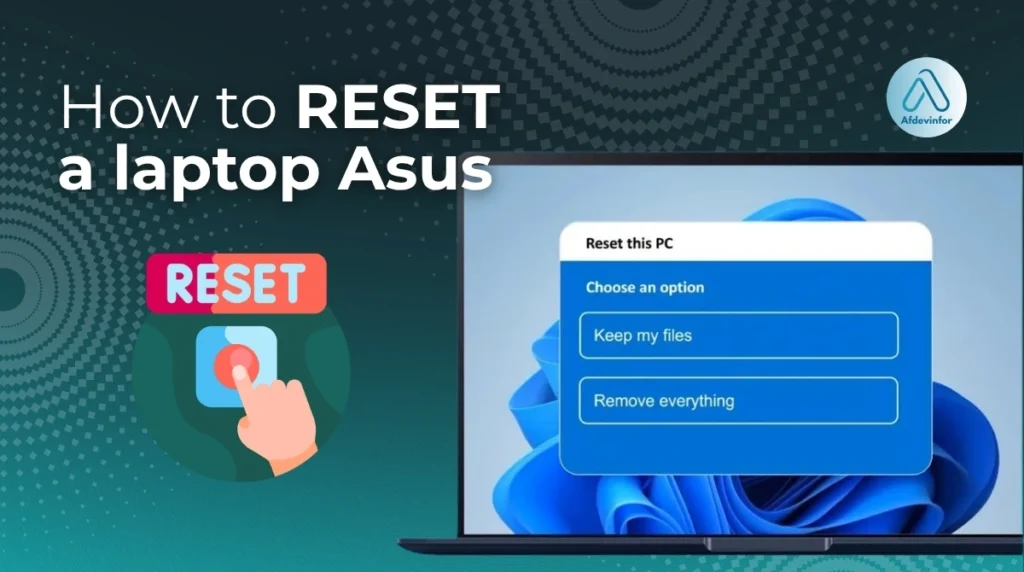If you’re wondering how to reset a laptop Asus makes, you’ve come to the right place. Over my 10 years working with hardware, I’ve seen countless laptops slow to a crawl due to software bloat, corrupted files, or stubborn malware. Resetting your Asus laptop can feel like a drastic step, but it’s often the most effective way to restore its original speed and performance. It gives your machine a completely fresh start.
In this guide, I’ll walk you through the entire process, from essential preparation to what to do after the reset is complete, ensuring you don’t lose any critical data along the way. Quick summary for you:
- Preparation is everything: Back up files, save software keys, and plug in power before resetting.
- Choose your reset type wisely: “Keep my files” for performance fixes, “Remove everything” for a full refresh.
- Follow the right method: Use Windows settings (if accessible) or recovery options like F9 or Advanced Startup.
- Troubleshoot smartly: Handle reset failures, missing keys, or password issues with built-in recovery tools.
- Post-reset setup: Update Windows, reinstall Asus drivers, and restore your personal files safely.
1. Before you reset: The essential pre-flight checklist
Before you click a single button, we need to do some prep work. Rushing into a factory reset is the number one cause of data loss and frustration I see. This checklist is your safety net, designed to make the process smooth and successful.
| Warning: Do not skip these steps. A few minutes of preparation can save hours of frustration and prevent permanent data loss. |
1.1. Step 1: Securely back up your personal files and folders
A complete data backup before factory reset is the most critical first step. This process will wipe your personal information, so you must have a copy saved elsewhere. I’ve seen the heartbreak of lost family photos and important documents too many times; this is your insurance policy.
Here are the types of files you should focus on backing up:
- Documents: Word files, PDFs, spreadsheets, and presentations.
- Photos & Videos: All your personal media from the Pictures and Videos folders.
- Downloads: Go through your Downloads folder for anything important you may have forgotten.
- Browser Bookmarks: Most browsers let you export your bookmarks to a file.
- Desktop Files: Don’t forget anything you’ve saved directly to your desktop.
To help you decide on a method, here is a quick comparison:
| Method | Cost | Speed | Convenience |
|---|---|---|---|
| Cloud Storage (Google Drive, OneDrive, Dropbox) | Free for a limited space, subscription for more. | Depends on your internet speed. | Very high; accessible from anywhere. |
| External Hard Drive / SSD | One-time purchase cost. | Very fast, especially with USB 3.0+. | High; requires a physical device. |
1.2. Step 2: Find and save your software license keys
This is a pro-tip that many people forget. After resetting, you’ll have to reinstall all your programs, and paid software like Microsoft Office, Adobe Suite, or other professional tools will require a license key to activate. Losing these keys means you might have to repurchase the software.
Before you reset, I recommend you find and save these keys. You can often find them in your email purchase receipts. Alternatively, you can use a free key-finder tool to scan your system and retrieve them for you.
| Pro-Tip Tools like Belarc Advisor or Magical Jelly Bean Keyfinder are popular free options that can scan your current installation and display the license keys for many of your installed programs. Save the list to your external backup drive. |
1.3. Step 3: Ensure your laptop is plugged into a power source
This may sound obvious, but it’s a non-negotiable rule. A power loss in the middle of a factory reset can corrupt the operating system, potentially leaving your laptop unable to boot at all.
Plug your Asus laptop into its charger and leave it plugged in for the entire duration of the reset process.
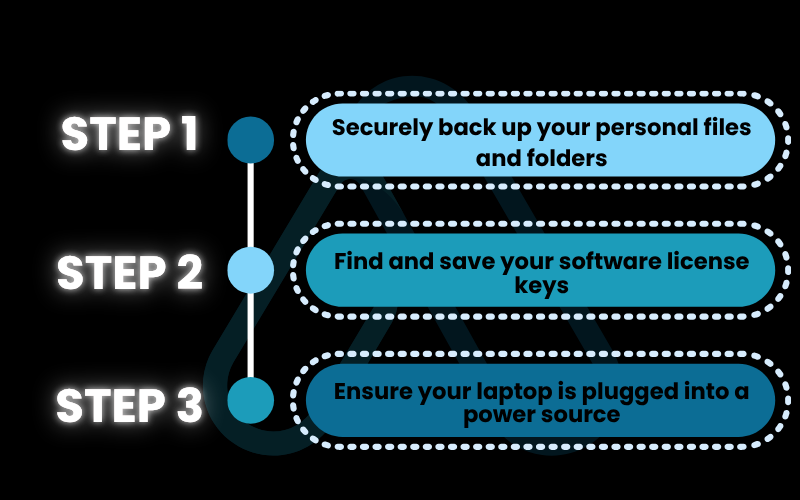
2. How to reset a laptop Asus from within Windows
If you can still start up and log into your laptop, this is the easiest and most recommended path. The built-in Windows recovery tools are powerful and straightforward. My instructions below are separated for Windows 11 and 10, as the navigation is slightly different. This section covers the standard Asus laptop Windows reset procedure.
2.1. The critical choice: ‘Keep my files’ vs. ‘Remove everything’
During the reset process, Windows will present you with two main options. This is a crucial decision point, and understanding the difference is key to achieving your goal.
Here’s a breakdown to help you choose:
| Option | What it Does | Best For |
|---|---|---|
| Keep my files | Reinstalls Windows but keeps your personal files (documents, photos, etc.) in your user folder. It removes all installed applications and settings. | Fixing performance issues, sluggishness, or software errors without having to restore data from a backup. |
| Remove everything | Completely erases the hard drive and reinstalls a fresh copy of Windows. All personal files, applications, and settings are permanently deleted. | Preparing the laptop for sale, giving it away, or removing a persistent virus or malware infection. |
Even if you choose ‘Keep my files’, I still insist that you back up your data from Step 1.1. Things can go wrong, and a separate backup is your only guarantee.
2.2. Step-by-step guide for Windows 11
Here is the precise process for resetting your Asus laptop running Windows 11:
- Click the Start button and open the Settings app (the gear icon).
- In the left-hand menu, select System.
- Scroll down and click on Recovery.
- Under ‘Recovery options’, you’ll see ‘Reset this PC’. Click the Reset PC button. [Screenshot of Windows 11 Recovery settings]
- A new window will appear titled ‘Choose an option’. Here you will select either Keep my files or Remove everything, based on your decision in the previous section.
- The next screen asks how you’d like to reinstall Windows. I recommend choosing Local reinstall as it’s faster and doesn’t require a strong internet connection.
- Finally, you’ll see a confirmation screen summarizing your choices. Click Reset to begin the process. Your laptop will restart and may do so several times. This can take anywhere from 30 minutes to over an hour.
2.3. Step-by-step guide for Windows 10
For the many Asus laptops still running Windows 10, the process is very similar. Here are the steps:
- Click the Start button and open the Settings app (the gear icon).
- Click on Update & Security.
- In the left-hand menu, select Recovery.
- Under the ‘Reset this PC’ section, click the Get started button. [Screenshot of Windows 10 Recovery settings]
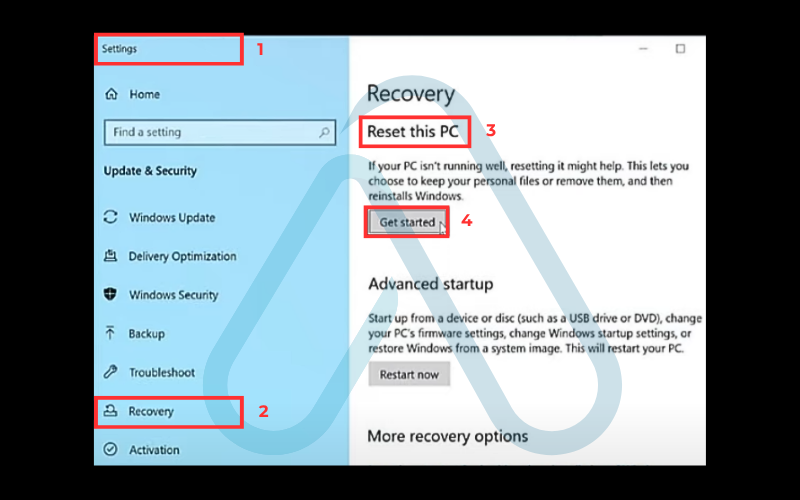
5. From here, the steps are identical to Windows 11. You will be asked to choose between Keep my files and Remove everything.
6. Make your selection, choose Local reinstall, and confirm your decision by clicking Reset.
3. How to reset your Asus laptop when Windows won’t load
If your laptop is stuck in a boot loop or you can’t get to the login screen, don’t worry. This is a common and frustrating problem, but there are still powerful tools you can use. This section will answer the question of how I restore an Asus laptop to factory settings if Windows won’t load, using methods that don’t require logging in.
3.1. Using the Asus recovery partition (the F9 key method)
Most Asus laptops come with a hidden section on the hard drive called a recovery partition. It contains a factory image of the original operating system. You can often access this by pressing a specific key during startup.
Here’s how to use the Asus recovery key F9 method:
- Power off your laptop completely. If it’s stuck, hold the power button for 10-15 seconds until it shuts down.
- Press the power button to turn the laptop on.
- Immediately after pressing the power button, start tapping the F9 key repeatedly until you see a ‘Please wait’ screen, followed by the recovery menu. Timing is crucial here; if Windows starts to load, you’ll need to shut down and try again.
- The Asus recovery utility will guide you through the process. The prompts will be specific to Asus, but they will essentially perform a factory reset, returning the laptop to the state it was in when you first bought it.
| Note On some newer models, this key might be different. If F9 doesn’t work, F8 or F12 are other possibilities, but F9 is the most common for Asus. |
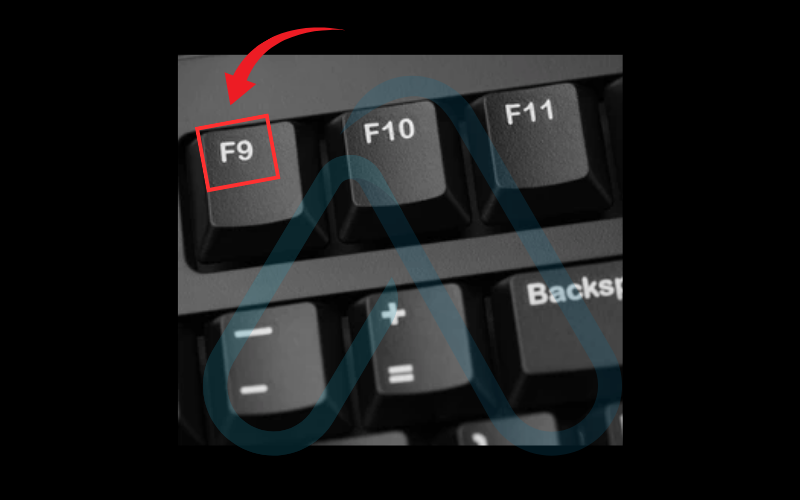
3.2. Using the Windows advanced startup options menu
If the F9 method doesn’t work, there’s a universal Windows method that serves as a great backup. You can force the laptop to boot into the Windows Recovery Environment (WinRE).
Follow these steps:
- Power off the laptop completely by holding the power button.
- Press the power button to turn it on. As soon as you see the Asus logo or the spinning dots of Windows loading, press and hold the power button again to force it to shut down.
- Repeat this process two more times (a total of three forced interruptions).
- On the fourth boot-up, Windows will automatically load into the Advanced Startup Options menu, saying ‘Preparing Automatic Repair’.
- From this blue menu screen, click on Troubleshoot.
- Next, click on Reset this PC.
- From this point, the process is the same as described in section 2. You’ll be able to choose between ‘Keep my files’ and ‘Remove everything’ to start the reset.
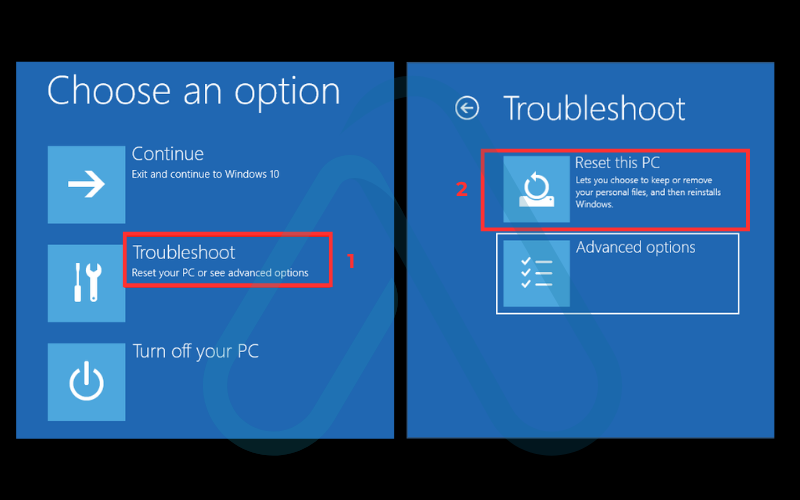
4. Expert troubleshooting for common Asus reset problems
Sometimes, things don’t go as planned. Over the years, I’ve encountered almost every possible error during a reset. Here’s my expert guide to solving the most common issues that can occur, providing some clear advice for troubleshooting Asus reset issues.
4.1. Problem: The F9 or F8 recovery key isn’t working
This is a very common issue. If you’re pressing the Asus recovery key F9 and nothing happens, here are the likely reasons:
- The recovery partition is deleted or corrupted: This can happen if you’ve previously installed a different operating system or repartitioned the hard drive.
- Fast Boot is enabled: Some modern laptops have a ‘Fast Boot’ or ‘Fast Startup’ feature in the BIOS/UEFI that skips the window where the F9 key press is detected.
- Windows Upgrade: If the laptop came with Windows 8 and was later upgraded to Windows 10, the link to the original recovery partition may be broken.
Solution: Your best bet is to use the method described in section 3.2, the Windows Advanced Startup Options. This method doesn’t rely on the manufacturer’s partition and is part of the core Windows OS.
4.2. Problem: You need to reset the laptop without the password
If you’ve forgotten your Windows login password, you might think you’re locked out for good. However, you can still initiate a reset without ever logging in. To reset an Asus laptop without the password, you don’t need any special software.
Here's the trick I always show people:
From the Windows login screen, click the power icon in the bottom-right corner. Now, hold down the `Shift` key on your keyboard and, while still holding it, click `Restart`.
This will reboot the laptop directly into the blue Advanced Startup Options menu. From there, you can navigate to Troubleshoot > Reset this PC just as described in section 3.2. While you don’t need the password to start the reset, remember that choosing ‘Remove everything’ will erase all your files, which will be inaccessible anyway without the password.
4.3. Problem: The reset process fails or gets stuck
It’s incredibly stressful to see a message like ‘There was a problem resetting your PC’ or to have the progress percentage stuck for hours. When this happens, a calm, methodical approach is best.
Here is the diagnostic process I recommend:
- Wait longer: Sometimes, especially on older laptops with mechanical hard drives, the process can take many hours. If it’s stuck at a certain percentage, I’d give it at least 2-3 hours before intervening.
- Perform a hard reboot: If it’s truly frozen, hold the power button until the laptop shuts down, then try initiating the reset again. Sometimes, the second attempt works perfectly.
- Check for hardware issues: A failing hard drive is a common cause of reset failures. If the reset repeatedly fails, it may be a sign that the drive needs to be replaced.
- Create a bootable USB drive: As a last resort, you can use another computer to download the official Windows Media Creation Tool. This allows you to create a bootable USB stick with a fresh copy of Windows. You can then boot your Asus laptop from this USB and perform a clean installation, which bypasses all the built-in recovery tools.
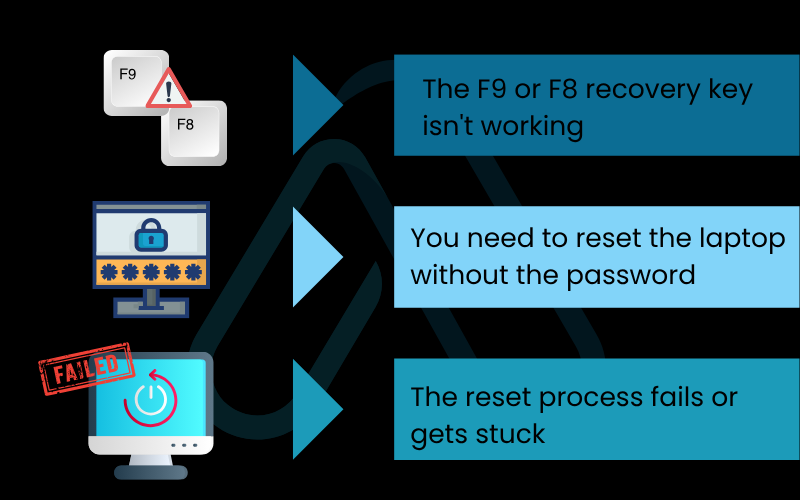
5. The post-reset checklist: Setting up your laptop for success
Congratulations, the reset is complete! But the job isn’t quite done. A factory reset brings your laptop back to its original state, which is often outdated. Following this post-reset checklist will ensure your newly refreshed machine is secure, stable, and ready to use.
5.1. Step 1: Complete the Windows setup and run all updates
After the reset, you’ll be greeted by the Windows Out-of-Box Experience (OOBE), where you’ll set your language, region, and create a user account. Once you reach the desktop, your first and most critical task is to run Windows Update.
The reset image on your machine could be months or even years old, leaving it vulnerable to security threats. Connect to the internet and navigate to Settings > Windows Update > Check for updates. Keep checking and installing updates until it says you are completely up to date. This may require several restarts.
5.2. Step 2: Reinstall essential Asus drivers and software
While Windows Update is excellent at installing most generic hardware drivers, it sometimes misses specific, optimized drivers for your Asus hardware, like the trackpad, keyboard hotkeys, or power management software. This can result in functionality issues.
I always recommend visiting the official Asus support website. You’ll need to find your laptop’s specific model number to get the right drivers.
| Pro-Tip You can usually find the exact model number on a sticker on the bottom of your laptop case. Go to the Asus support website, enter that model number, and download the latest drivers for your version of Windows, especially for the Chipset, Audio, and Touchpad. |
5.3. Step 3: Restore your personal files from your backup
Now it’s time to bring the process full circle and make your laptop yours again. This is where your diligent preparation in Section 1 pays off. You can now safely restore the personal data you backed up.
Here are your final actions:
- Install Antivirus: Before restoring any files, I strongly recommend installing a reputable antivirus program as your first line of defense.
- Plug in External Drive: If you used an external drive, plug it in and begin copying your documents, photos, and other files back to their respective folders.
- Re-sync Cloud Services: If you used a cloud service like OneDrive, install the desktop client and log in to begin syncing your files back to the device.
- Reinstall Programs: Reinstall the essential applications you need, using the license keys you saved earlier.
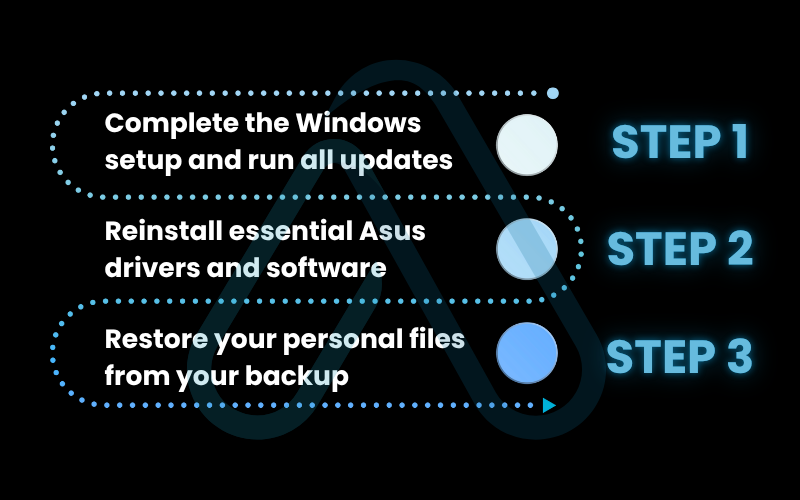
6. FAQs about how to reset a laptop asus
Here are quick answers to some of the most common questions I get about this process.
Why won’t my Asus laptop reset using F9 or F8?
The recovery partition may be missing or corrupted. Use the Advanced Startup menu in Windows to reset instead.
How do I factory reset my Asus laptop without a password?
From the login screen, hold Shift and click Restart. In recovery mode, choose Reset this PC to start without a password.
What is the difference between ‘keep my files’ and ‘remove everything’?
‘Keep my files’ reinstalls Windows but keeps personal data. ‘Remove everything’ wipes all files and settings for a full factory reset.
What should I do immediately after resetting my laptop?
Run Windows Update, install missing Asus drivers, and restore your backed-up files.
Glossary of key terms
| Abbreviation | Full Term | Meaning |
|---|---|---|
| OS | Operating System | The primary software that manages all the hardware and software on a computer, such as Windows 10 or Windows 11. |
| WinRE | Windows Recovery Environment | A companion operating system with tools to troubleshoot, recover, or reset Windows when it cannot start normally. |
| OOBE | Out-of-Box Experience | The guided setup process a user goes through when turning on a new computer or after a factory reset is used to configure settings like language, region, and user accounts. |
7. Final thoughts
By following this comprehensive guide, you’ve not only learned how to reset your Asus laptop but also how to prepare for, execute, and troubleshoot the process like a pro. A factory reset is a powerful tool in any computer user’s arsenal for restoring performance and ensuring security. With your careful preparation and step-by-step execution, your device should now be running smoothly and securely, just like it did on day one.
Here are the most critical takeaways to remember:
- Backup is non-negotiable: Always back up your personal files to an external drive or cloud service before starting a reset.
- Choose the right reset: Understand the difference between ‘Keep my files’ (for performance fixes) and ‘Remove everything’ (for a clean slate or selling).
- Plan for post-reset setup: The process isn’t over after the reset. Immediately run Windows updates and install necessary Asus drivers for full functionality.
- Know the workarounds: If the standard methods fail, the ‘Shift + Click Restart’ trick or forcing Advanced Startup are your powerful backup plans.
At Afdevinfo, my goal is to simplify complex tech challenges. I hope this guide has empowered you to take control of your device’s performance. For more in-depth guides, explore our Productivity & Automation categories.


